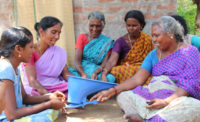Nov. 19 is World Toilet Day
This year's theme is "When Nature Calls"

World Toilet Day, an annual event to help bring awareness to the fact that billions of people around the world do not have access to safe, clean, and reliable toilets or water for drinking, bathing, cooking, and handwashing, will be held this year on Monday, Nov. 19.
The theme this year is "When Nature Calls," and while a tad humorous, the problems related to accessible working toilets and safe drinking water are a major problem worldwide.
It is estimated that one in three people do not have access to a toilet or dependable “potable” water supplies.
According to a joint 2017 report by the World Health Organization (WHO) and UNICEF, Ethiopia has the highest percentage of people in the world – about 90 percent - without access to toilets.
India comes in second. An estimated 730 million people in India live without basic sanitation facilities, according to these organizations.
“World Toilet Day promoters are asking us all to become WASH (Water, Sanitation and Hygiene) ambassadors on Nov. 19,” says Klaus Reichardt, CEO and found founder of Waterless Co., Inc.
“The job of a WASH ambassador is to spread the word and encourage action. The lack of clean, sanitary, and reliable toilets is one of the major reasons for disease and death around the globe.”
According to Reichardt, some of the ways we can all become WASH ambassadors include the following:
• Photograph how your organization is helping to promote sanitation and the proper use of toilets in your community. Deliver to members@wsscc.org by November 14; a high-tech camera will be awarded for the winning photo
• Take part in one of the many World Toilet Day events around the world, which are listed here
• Share social media cards available from this site
• Download posters, artwork, and fact sheets
“Most importantly, get involved,” adds Reichardt. “I would like to see more corporate sponsors backing these efforts. Millions if not billions of people can benefit from their efforts.”
Fact Sheet:
• Today, an estimated 4.5 billion people live without a safe toilet
• Nearly 900 million still practice open defecation, which can spread disease on a massive scale
• Approximately 80 percent of wastewater flows back into the environment without being treated (Sato et al., 2013)
• Nearly two million people use drinking water with no protection against contamination
• Twenty percent of schools worldwide have no toilets.
Looking for a reprint of this article?
From high-res PDFs to custom plaques, order your copy today!





